Tananarive Due's Blog
September 29, 2016
On being a "revolutionary artist"
This week, writer/filmmaker Ava DuVernay premieres her documentary The 13th, which explores the history of and profound racial bias in our system of mass incarceration, at the New York Film Festival. (It debuts on Netflix and some theaters Oct. 7.)
 Director Ava DuVernay
Director Ava DuVernay
Also premiering this week: the Netflix series Luke Cage, where showrunner/writer Cheo Hodari Coker chose to make Cage’s superhero costume a hoodie as a way to honor Trayvon Martin and bring racial bias to light. (Not to mention how rare black superheroes on TV have been.) Both approaches are an act of artistic revolution.
What makes art “revolutionary”?
My first experience with revolutionary art was Alex Haley’s Roots. I read it when I was 11, and Kunta Kinte’s defiance gave me air and light. I began recording my own family’s oral histories and hand-writing a story about a young girl’s experience on the Middle Passage. Haley gave me the desire to better understand my world and a mission to try to right the wrongs of history--through my writing.
Today’s social-minded writers and artists are faced with a prime opportunity to help change the narratives of exclusion and disempowerment and create the stories WE think should be told to help build a better world.
When we think of social justice activists, we often think of people like my parents--my father, John Due, still a civil rights attorney at 81, or my late mother, Patricia Stephens Due, who spent 49 days in jail after a sit-in at Woolworth’s lunch counter in 1960 and was arrested multiple arrests in the 1960s. Or, we think of the Black Lives Matter movement and other activists staging protests in Charlotte and across the country. Or San Francisco 49ers quarterback Colin Kaepernick refusing to stand for the National Anthem.
 My mother arrested in 1963
My mother arrested in 1963
Whether or not we attend a protest or ever leave our computers, artists are revolutionaries too. But how can we create world-changing art without Message overwhelming Story? What are effective storytelling techniques to help readers embrace your passions? How can your own work be more inclusive? How do you write The Other?
Starting Oct. 7, my husband and collaborator, Steven Barnes, and I are offering a six-week webinar course: “Revolutionary Art: Writing for Social Justice.” With a combination of lectures, recorded interviews, and appearances by artists such as writer/producer Reggie Hudlin, six 90-minute segments will help artists gain clarity on the ways art can be revolutionary and help advance the national conversation on social justice. (Since all sessions are recorded, students can listen when they have time and take the course at their own pace.)
Check out the registration page here and listen to a freesample recording from a previous teleseminar on art and social justice. (If you sign up now, you can still register at the introductory price.)My novel-in-progress has been one of my most emotionally difficult writing projects, but one I think could also be important: it’s about a 12-year-old boy sent to a children’s prison in Florida in 1950. The novel will have ghosts, but the true horror is in the prison system itself, the quiet bureaucracy, and a town’s conspiracy of silence. (This novel was inspired by the real-lifeDozier School for Boys, where my great-uncle died in 1937.)
Although it’s a historical novel, I hope readers will see the many parallels between Jim Crow criminal justice and our criminal justice system today.
My short story collection, Ghost Summer—which just won a British Fantasy Award—introduces this novel’s fictitious town of Gracetown, where history lives in the soil and my characters must battle monsters both from without and within. Not all of the stories in the collection are set in Gracetown or have social justice themes, but all of them raise questions about what it means to be human—and since black characters have historically been so underrepresented in literature, even a declaration of humanity is a still a revolutionary act.
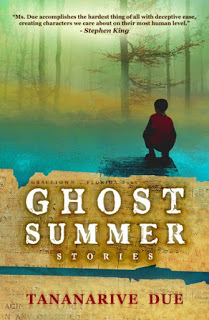
What does your revolutionary art look like?
Even as I grew up hearing stories of my mother’s heroism in the face of teargas and taunts, she made sure I understood that art is an important tool in activism. She knew I wanted to be a writer from the age of four, and she pointed out that the NAACP assigned a lot of resources to the Beverly/Hills Hollywood in the 1960s because the civil rights organization understood the importance of IMAGERY and STORIES to help create change. My respect for my parents and their passion for civil rights was so great that if they had even hinted that writing was a waste of time, I might not be a writer.
My parents believed I could raise my voice in my own way. You can too.
Writing for social justice need not be literal—like N.K. Jemisin’s novel The Fifth Season, which recently won a Hugo Award and is packed with imaginative fantasy world-building—but was inspired by Ferguson. And often, the mere insertion of characters from disenfranchised populations in our art can have a profound impact on creating new narratives.
We are superheroes. We are wizards. We are world-changers.
Steve and I both have taught extensively: I’m currently teaching Afrofuturism at UCLA, I’m on the faculty for the summertime VONA writers’ workshop for writers of color, and I’ve lectured at the Geneva Writers Conference. We both just returned from lecturing on a fantastic Caribbean cruise for writers, where we found a tribe of writers of all races and background who want to make a difference. Next March, I’ll be honored to appear with Dr. Angela Davis and other panelists at Black Women Rise in West Palm Beach, Florida.
I sign petitions, write letters, and contribute to causes when I can, but my primary voice is through my art. And in striving to make my characters as real and human as possible in the face of unimaginable odds, I hope to present a blueprint for change for all of us.
The course starts soon. Listen to the free sample and read what we’re offering. And please pass on our URL to a friend: www.createthenarrative.com. Hope to see you there!
Tananarive Due is an American Book Award winner, NAACP Image Award Winner, and British Fantasy Award winner. She teaches Afrofuturism at UCLA. Her website is www.tananarivedue.com.
 Director Ava DuVernay
Director Ava DuVernayAlso premiering this week: the Netflix series Luke Cage, where showrunner/writer Cheo Hodari Coker chose to make Cage’s superhero costume a hoodie as a way to honor Trayvon Martin and bring racial bias to light. (Not to mention how rare black superheroes on TV have been.) Both approaches are an act of artistic revolution.
What makes art “revolutionary”?
My first experience with revolutionary art was Alex Haley’s Roots. I read it when I was 11, and Kunta Kinte’s defiance gave me air and light. I began recording my own family’s oral histories and hand-writing a story about a young girl’s experience on the Middle Passage. Haley gave me the desire to better understand my world and a mission to try to right the wrongs of history--through my writing.
Today’s social-minded writers and artists are faced with a prime opportunity to help change the narratives of exclusion and disempowerment and create the stories WE think should be told to help build a better world.
When we think of social justice activists, we often think of people like my parents--my father, John Due, still a civil rights attorney at 81, or my late mother, Patricia Stephens Due, who spent 49 days in jail after a sit-in at Woolworth’s lunch counter in 1960 and was arrested multiple arrests in the 1960s. Or, we think of the Black Lives Matter movement and other activists staging protests in Charlotte and across the country. Or San Francisco 49ers quarterback Colin Kaepernick refusing to stand for the National Anthem.
 My mother arrested in 1963
My mother arrested in 1963Whether or not we attend a protest or ever leave our computers, artists are revolutionaries too. But how can we create world-changing art without Message overwhelming Story? What are effective storytelling techniques to help readers embrace your passions? How can your own work be more inclusive? How do you write The Other?
Starting Oct. 7, my husband and collaborator, Steven Barnes, and I are offering a six-week webinar course: “Revolutionary Art: Writing for Social Justice.” With a combination of lectures, recorded interviews, and appearances by artists such as writer/producer Reggie Hudlin, six 90-minute segments will help artists gain clarity on the ways art can be revolutionary and help advance the national conversation on social justice. (Since all sessions are recorded, students can listen when they have time and take the course at their own pace.)
Check out the registration page here and listen to a freesample recording from a previous teleseminar on art and social justice. (If you sign up now, you can still register at the introductory price.)My novel-in-progress has been one of my most emotionally difficult writing projects, but one I think could also be important: it’s about a 12-year-old boy sent to a children’s prison in Florida in 1950. The novel will have ghosts, but the true horror is in the prison system itself, the quiet bureaucracy, and a town’s conspiracy of silence. (This novel was inspired by the real-lifeDozier School for Boys, where my great-uncle died in 1937.)
Although it’s a historical novel, I hope readers will see the many parallels between Jim Crow criminal justice and our criminal justice system today.
My short story collection, Ghost Summer—which just won a British Fantasy Award—introduces this novel’s fictitious town of Gracetown, where history lives in the soil and my characters must battle monsters both from without and within. Not all of the stories in the collection are set in Gracetown or have social justice themes, but all of them raise questions about what it means to be human—and since black characters have historically been so underrepresented in literature, even a declaration of humanity is a still a revolutionary act.

What does your revolutionary art look like?
Even as I grew up hearing stories of my mother’s heroism in the face of teargas and taunts, she made sure I understood that art is an important tool in activism. She knew I wanted to be a writer from the age of four, and she pointed out that the NAACP assigned a lot of resources to the Beverly/Hills Hollywood in the 1960s because the civil rights organization understood the importance of IMAGERY and STORIES to help create change. My respect for my parents and their passion for civil rights was so great that if they had even hinted that writing was a waste of time, I might not be a writer.
My parents believed I could raise my voice in my own way. You can too.
Writing for social justice need not be literal—like N.K. Jemisin’s novel The Fifth Season, which recently won a Hugo Award and is packed with imaginative fantasy world-building—but was inspired by Ferguson. And often, the mere insertion of characters from disenfranchised populations in our art can have a profound impact on creating new narratives.
We are superheroes. We are wizards. We are world-changers.
Steve and I both have taught extensively: I’m currently teaching Afrofuturism at UCLA, I’m on the faculty for the summertime VONA writers’ workshop for writers of color, and I’ve lectured at the Geneva Writers Conference. We both just returned from lecturing on a fantastic Caribbean cruise for writers, where we found a tribe of writers of all races and background who want to make a difference. Next March, I’ll be honored to appear with Dr. Angela Davis and other panelists at Black Women Rise in West Palm Beach, Florida.
I sign petitions, write letters, and contribute to causes when I can, but my primary voice is through my art. And in striving to make my characters as real and human as possible in the face of unimaginable odds, I hope to present a blueprint for change for all of us.
The course starts soon. Listen to the free sample and read what we’re offering. And please pass on our URL to a friend: www.createthenarrative.com. Hope to see you there!
Tananarive Due is an American Book Award winner, NAACP Image Award Winner, and British Fantasy Award winner. She teaches Afrofuturism at UCLA. Her website is www.tananarivedue.com.
Published on September 29, 2016 07:40
October 8, 2015
Free webinar Friday: "Avoiding the Top 3 Mistakes New Writers Make" (and Effie Brown bonus)
What a week!
Last week, I launched my new short story collection, Ghost Summer, at EsoWon books in Los Angeles, where I was interviewed by awesome "Project Greenlight" producer Effie Brown. (To get a link for audio and video to that interview and join my mailing list, sign up here.)
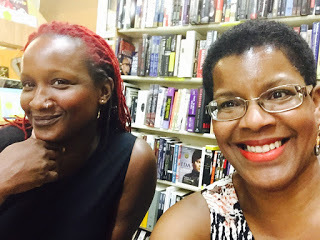 Effie and I talked about my experiences transitioning from novels to screenplays, and I revealed some of my worst mistakes as a new screenwriter.
Effie and I talked about my experiences transitioning from novels to screenplays, and I revealed some of my worst mistakes as a new screenwriter.
But mistakes are a part of life for all writers.
That's why I'm conducting a free webinar at 9p ET / 6p PT Friday (10/9) with husband/collaborator Steven Barnes on "Avoiding the Top 3 Mistakes New Writers Make."
I am not only an author and screenwriter, but I have taught writing at the MFA level for eight years, as well as undergraduate and post-graduate. I have been a writing coach and mentor. Too often, my students repeat the same mistakes...and I'd like to help you avoid making them too.
If you sign up for my mailing list, you'll receive the links to Effie Brown's interview AND a link to sign up for the webinar--and you'll be the first to hear news and offers. Or, you can simply sign up for the webinar.
Hope to see you there!
Last week, I launched my new short story collection, Ghost Summer, at EsoWon books in Los Angeles, where I was interviewed by awesome "Project Greenlight" producer Effie Brown. (To get a link for audio and video to that interview and join my mailing list, sign up here.)
 Effie and I talked about my experiences transitioning from novels to screenplays, and I revealed some of my worst mistakes as a new screenwriter.
Effie and I talked about my experiences transitioning from novels to screenplays, and I revealed some of my worst mistakes as a new screenwriter.But mistakes are a part of life for all writers.
That's why I'm conducting a free webinar at 9p ET / 6p PT Friday (10/9) with husband/collaborator Steven Barnes on "Avoiding the Top 3 Mistakes New Writers Make."
I am not only an author and screenwriter, but I have taught writing at the MFA level for eight years, as well as undergraduate and post-graduate. I have been a writing coach and mentor. Too often, my students repeat the same mistakes...and I'd like to help you avoid making them too.
If you sign up for my mailing list, you'll receive the links to Effie Brown's interview AND a link to sign up for the webinar--and you'll be the first to hear news and offers. Or, you can simply sign up for the webinar.
Hope to see you there!
Published on October 08, 2015 08:11
September 1, 2015
The toxic racial imagery in Fear the Walking Dead -- and why Black Lives Matter on TV too
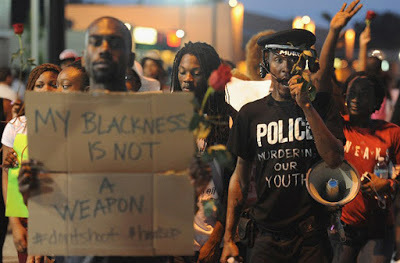 Ferguson protesters in Missouri in 2014. No photo credit provided.
Ferguson protesters in Missouri in 2014. No photo credit provided. As a lifelong horror lover who has co-written and co-produced a short zombie film, I've often pondered why zombies have so taken hold of the public imagination. An uncomfortable revelation dawned on me in 2014 as I watched the police army amass in reaction to protesters in Ferguson:
We--people of color, and black people in particular--are this country's zombies. We are the horrifying shadow suburbia is afraid will slip through the window at night. We are the reason for the U.S. history of stockpiling guns, dating back to fears of slave rebellions. Terror over the nation's "browning" make us the shambling masses who drive people to lock their doors and fantasize about barricades and sudden flight. It's not true for all of us who love zombies, obviously, but it's the simmering social subtext.
Recently, science fiction author Greg Bear echoed my observation during a lunch with me and my husband, author Steven Barnes, at the World Science Fiction Convention (Worldcon): American horror, he said, has its origins in fear of The Other.
Which brings me to the new AMC series "Fear the Walking Dead," which had so much blatant anti-black imagery in its first two episodes that even white reviewers took notice. The word The Hollywood Reporter used was "polarizing," but I'm comfortable with "racist." This week, Vanity Fair published the rhetorical headline "Has Fear The Walking Dead Inherited The Walking Dead's Race Problem?" Another blogger wrote yesterday on how the show is angering fans. And this post from a black writer: "Why I'm Quitting Fear the Walking Dead: It's Kind of Racist."
If you've been paying attention to the show's predecessor, "The Walking Dead," these charges of racial bias against black men in particular are far from new. My husband stopped watching it with me after the strong Alpha from the graphic novels, Tyreese, was killed off after being rendered utterly ineffectual on the TV version. (This after the insulting creation and sacrificial death of "T-Dog," who was even more ineffectual.) We've heard the dismissive "Who, us?" responses from showrunners, basically, "Hey, it's the zombie apocalypse--everybody dies!"
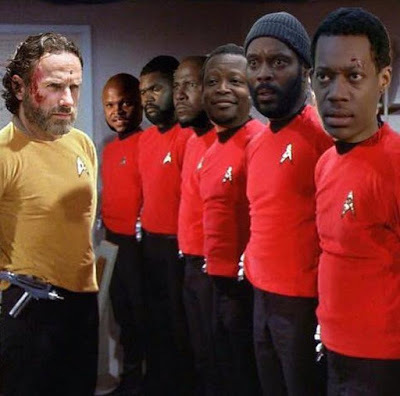 The parade of dead black men from "The Walking Dead"
The parade of dead black men from "The Walking Dead" But "Fear of the Walking Dead" shows its hand in ways that even its predecessor did not. During a moment in Episode 2, I said to my husband, "Oh, God--do you think they would...?" And his response, even as someone who had disavowed "The Walking Dead" was: "They wouldn't. It would be too obvious."
Well, they did. WARNING: SPOILERS AHEAD.
One of the frustrations that led to me making my own horror short film was the frustrating tropes around black characters, particularly how often black characters die first. It's a kind of "death lite"--not the real people, but just enogh to scare us for the real characters' safety. Blacks also tend to appear as Spiritual Guides or Sacrifical Negroes (or, in the case of the film Annabelle, as both). I blogged about this while we were crowdfunding in 2013: "Eulogy for the Sacrificial Negro."
So what did "Fear the Walking Dead" do?
The first character killed off was black. Not just black--but a black drug dealer. And a weak black drug dealer who is fought off by his jonesing white client. So, yes, from the very start, the show has introduced an ineffectual black thug as the first zombie to die. A thug's black body laid out on the street. (As a culture, that's how we like men's black bodies: laid out dead on the street.)
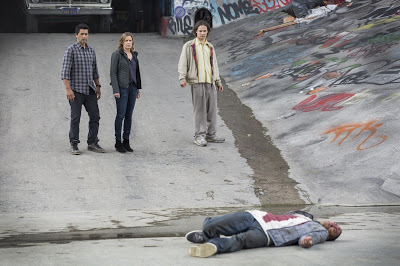 But it doesn't stop there, oh no.
But it doesn't stop there, oh no.Episode 1 also managed to throw in a good old-fashioned black man jump scare with the school principal, a la the weak Candyman sequels.
Then came Episode 2, which doubled down on the imagery. Because, boo-hoo, the white teenage girl's black boyfriend is INFECTED. (I could almost hear the collective sigh of relief as she was forced to leave him suffering in bed before he could bite anyone--or turn into a more serious relationship.)
And then came the moment when my husband said "They wouldn't."
While scavenging for supplies, survivors run across the shambling form of--you guessed it--the black school principal, who must be violently dispatched with a fire extiguisher. So all three of the black men the main characters have in their circle, the only black people we know, are either zombies or infected. In the first two episodes.
The showrunner, Dave Erickson, blamed it on casting. And then, even after they realized what had gone awry (assuing they considered it "awry"), they said they wouldn't change it because the story is the story. So, whatever.
I might have been able to swallow all of that without being so angry I could barely get to sleep if not for the cynical use of protest imagery as a backdrop to the zombie storyline. So now, all of a sudden, they're so politically astute that they can throw in a protest against a police shooting that turns into a riot. Because, hey, that's what would happen, right? Never mind that these are real issues and real crises based on the same societal fear of black men the show feeds upon.
I wrote off the issues in "The Walking Dead" as a "blind spot," i.e. what happens when you have a show with a diverse cast without a diverse writing room. (Correct me if I'm wrong, but I don't think there are any black writers for either show. I would LOVE to know if there are; clearly, they need some backup.) But despite the protestations of the showrunner of "Fear the Walking Dead," the use of black male death in this show FEELS much more intentional. More like the desired effect.
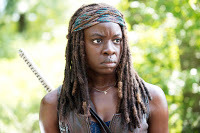 What is also maddening in both shows is a kind of divide-and-conquer use of diversity, i.e. the Asian-American character in "The Walking Dead," Glenn (played by Steven Yeun) is tough and sexual, and the black FEMALE character, Michonne (played by Danai Gurira) is dynamic and singular, so we're not supposed to notice the way the black men are treated. Likewise, "Fear the Walking Dead" features Maori actor Cliff Curtis and several Latino/a actors, including one of my very favorite performers, Ruben Blades.
What is also maddening in both shows is a kind of divide-and-conquer use of diversity, i.e. the Asian-American character in "The Walking Dead," Glenn (played by Steven Yeun) is tough and sexual, and the black FEMALE character, Michonne (played by Danai Gurira) is dynamic and singular, so we're not supposed to notice the way the black men are treated. Likewise, "Fear the Walking Dead" features Maori actor Cliff Curtis and several Latino/a actors, including one of my very favorite performers, Ruben Blades.In these shows, the successes of other marginalized groups come at the specific cost of black men.
I admit it: I kept watching "The Walking Dead" because of Michonne even after my husband quit. I have a Michonne action figure on my desk. And I wanted to like "Fear the Walking Dead." It's exactly the origin story I've been waiting for, and so much of it could work for me except for the blatant visual hostiliy to my race.
What we call "just entertainment" is never that. I have an 11-year-old son, and I believe that the imagery on shows like this makes the world less safe for him (although he does not watch it). Gives solace to people who do not like him, or might want to hurt him, based on his skin color. Makes him seem like more of a monster because that is the way society is ready to treat him.
I also have some specific suggestions for the teams behind "The Walking Dead" and "Fear the Walking Dead": stop your deny, deny, deny strategy. Your shows have a problem. Face up to it, say it's not all right, and vow to fix it.
And this is a message to all TV: Since you now love featuring actors of color because of the shifting Nielsen demographics, add more writers of color. Hire more black showrunners.
Stop the lazy line "There aren't any black writers who write horror." I have appeared in anthologies full of black horror writers, I know other black horror screenwriters, so there are many. Look around. If you must, do a national search like "Saturday Night Live" did.
You'd be surprised at the gems you can find when you stop denying and decide it really matters.
Tananarive Due is a novelist and screenwriter based in Los Angeles. She has won an American Book Award and an NAACP Image Award. Her website is at www.tananarivedue.com
Published on September 01, 2015 13:05
August 13, 2015
Tananarive Due's first short story collection, Ghost Summer (Sept. 1)
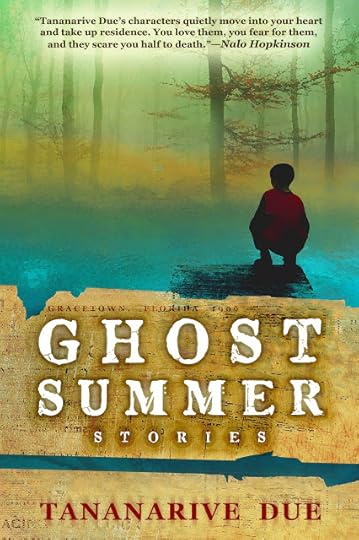
Publishers Weekly (Starred review) - “In these extraordinary tales, American Book Award–winner Due (My Soul to Take) uses a clear-eyed view of history to explain (but never excuse) the present.” READ MORE HERE
Ghost Summer named one of Publisher’s Weekly’s “Most Anticipated Books of Fall 2015”
About Ghost Summer:
Whether weaving family life and history into dark fiction or writing speculative Afrofuturism, American Book Award winner and Essence bestselling author Tananarive Due’s work is both riveting and enlightening. In her debut collection of short fiction, Due takes us to Gracetown, a small Florida town that has both literal and figurative ghost; into future scenarios that seem all too real; and provides empathetic portraits of those whose lives are touched by Otherness. Featuring an award-winning novella and fifteen stories—one of which has never been published before—Ghost Summer: Stories is sure to both haunt and delight.
*****
On Ghost Summer:
“Tananarive Due’s characters quietly move into your heart and take up residence. You love them, you fear for them, and they scare you half to death.” –Nalo Hopkinson, author of Hominidsand Brown Girl in the Ring
“Beautiful and terrifying. Tananarive Due is the modern master of horror and humanity.” –Daniel José Older, author of Shadowshaper
"When you read a Tananarive Due story you know you are in for a treat. She pulls you in from the very first line and does not let go. " –Dolen Perkins-Valdez, New York Times bestselling author of Wench and Balm
On the works of Tananarive Due:
“I enjoy reading the kind of novel that seduces me right into it and makes me forget about work or sleep. My Soul to Keep does that beautifully.” —Octavia E. Butler
“Ms. Due accomplishes the hardest thing of all with deceptive ease, creating characters we care about on their most human level.” –Stephen King
“Smart, soulful, craft Tananarive Due deserves the attention of everyone interested I contemporary American fiction. …She is one of the best and most significant writers of her generation.” –New York Times bestselling author Peter Straub
ORDER YOUR COPY OF GHOST SUMMER HERE.
Published on August 13, 2015 08:46
December 12, 2014
Online Screenwriting Workshop January 10-31, 2015 with Tananarive Due and Steven Barnes
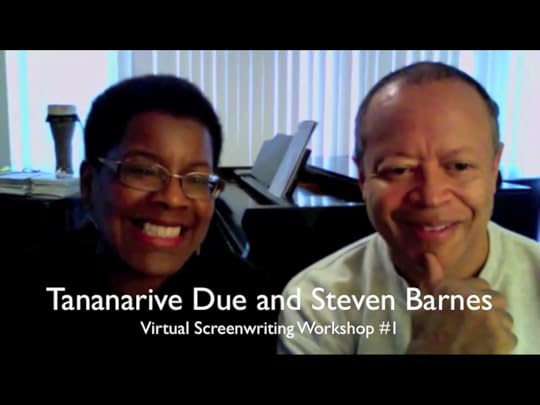 Are you working on a screenplay or want to get started on you? Would you like input from industry professionals on your screenplay idea?Are you an author who would like to learn to adapt your books to film?Whether you’re a screenwriter, a novelist or a producer, there has never been a more exciting time to try to get your foot in the door in television and film. But it all begins on the page – with a terrific screenplay or teleplay.After a successful fall workshop, authors and screenwriters Steven Barnes and Tananarive Due (WGA) are offering an online screenwriting workshop Jan. 10-31 to help you whip your project into shape. For the next 48 hours, you can register for the early-bird fee of only $250. (Until midnight PST Friday, Dec. 12.) Then our Christmas rate is $300 until Dec. 24th. Regular registration if $350–so save $100 by registering now. Space is limited.Here’s what one of our writers said midway through our fall workshop: “I want to thank you and Steve for an incredible experience thus far. I have truly learned a lot…..and I went to FILM SCHOOL!”REGISTER NOW: Here’s what you get:One 30-minute personal phone consultation with Steven Barnes or Tananarive DueNotes on 10 pages of your screenplay and treatment/outline. (Choose whether to receive notes at the start of the workshop, during, or at the end of the workshop.)Four weekly hour-long video Google Hangouts sessions with instructors Steven Barnes and Tananarive DueCollege-level syllabus with outside viewing and readingA guest appearance by an industry professional to answer your questionsPeer review from other screenwriters in the workshopHere’s what the workshop requires: Registration fee ($250 early-bird / $300 regular / $350 late) SPACE IS LIMITED)An existing screenplay or a screenplay idea you can outlineRECOMMENDED TEXTBOOK: Story by Robert McKeeWillingness to participate in peer review with other workshop membersInternet access for one-hour weekly Google Hangouts lectures / discussion
Are you working on a screenplay or want to get started on you? Would you like input from industry professionals on your screenplay idea?Are you an author who would like to learn to adapt your books to film?Whether you’re a screenwriter, a novelist or a producer, there has never been a more exciting time to try to get your foot in the door in television and film. But it all begins on the page – with a terrific screenplay or teleplay.After a successful fall workshop, authors and screenwriters Steven Barnes and Tananarive Due (WGA) are offering an online screenwriting workshop Jan. 10-31 to help you whip your project into shape. For the next 48 hours, you can register for the early-bird fee of only $250. (Until midnight PST Friday, Dec. 12.) Then our Christmas rate is $300 until Dec. 24th. Regular registration if $350–so save $100 by registering now. Space is limited.Here’s what one of our writers said midway through our fall workshop: “I want to thank you and Steve for an incredible experience thus far. I have truly learned a lot…..and I went to FILM SCHOOL!”REGISTER NOW: Here’s what you get:One 30-minute personal phone consultation with Steven Barnes or Tananarive DueNotes on 10 pages of your screenplay and treatment/outline. (Choose whether to receive notes at the start of the workshop, during, or at the end of the workshop.)Four weekly hour-long video Google Hangouts sessions with instructors Steven Barnes and Tananarive DueCollege-level syllabus with outside viewing and readingA guest appearance by an industry professional to answer your questionsPeer review from other screenwriters in the workshopHere’s what the workshop requires: Registration fee ($250 early-bird / $300 regular / $350 late) SPACE IS LIMITED)An existing screenplay or a screenplay idea you can outlineRECOMMENDED TEXTBOOK: Story by Robert McKeeWillingness to participate in peer review with other workshop membersInternet access for one-hour weekly Google Hangouts lectures / discussion
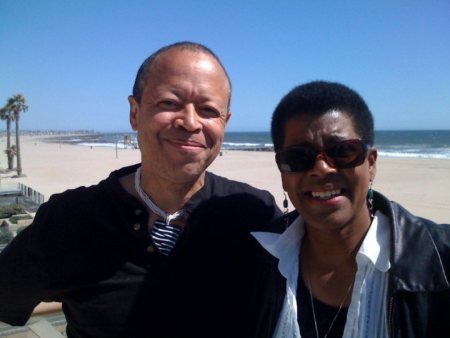 Who are the instructors? Steven BarnesNew York Times bestseller Steven Barnes has written more than twenty-five science fiction, fantasy, and horror novels. His “Stitch in Time” episode of “The Outer Limits” won an Emmy. The NAACP Image Award winner also has written for “The New Twilight Zone,” “StarGate,” Andromeda,” and “Ben 10.” He has been nominated for written for Hugo, Nebula and Cable Ace Awards. In 2013, he and his wife, Tananarive Due, co-wrote and co-produced the short film “Danger Word,” based on their novel,Devil’s Wake. He and Due recently sold a cable TV adaptation–details soon!Tananarive Due Tananarive Due, a member of the Writer’s Guild of America (WGA), has been named to the Grio100 and Ebony Power 100. The Essence bestseller and NAACP Image Award winner has also won an American Book Award for The Living Blood. She recently received a Lifetime Achievement Award in the Fine Arts from the Congressional Black Caucus. She is the former Cosby Chair in the Humanities at Spelman College. In addition to co-producing and co-writing the short film “Danger Word” with Steven Barnes, she currently has several book projects under option. She and Barnes recently sold a cable TV adaptation of one of her ovels–details soon! WANT TO ENROLL? CLICK HERE TO REGISTER NOW: You may also email us your questions at Tanacoach@gmail.com.
Who are the instructors? Steven BarnesNew York Times bestseller Steven Barnes has written more than twenty-five science fiction, fantasy, and horror novels. His “Stitch in Time” episode of “The Outer Limits” won an Emmy. The NAACP Image Award winner also has written for “The New Twilight Zone,” “StarGate,” Andromeda,” and “Ben 10.” He has been nominated for written for Hugo, Nebula and Cable Ace Awards. In 2013, he and his wife, Tananarive Due, co-wrote and co-produced the short film “Danger Word,” based on their novel,Devil’s Wake. He and Due recently sold a cable TV adaptation–details soon!Tananarive Due Tananarive Due, a member of the Writer’s Guild of America (WGA), has been named to the Grio100 and Ebony Power 100. The Essence bestseller and NAACP Image Award winner has also won an American Book Award for The Living Blood. She recently received a Lifetime Achievement Award in the Fine Arts from the Congressional Black Caucus. She is the former Cosby Chair in the Humanities at Spelman College. In addition to co-producing and co-writing the short film “Danger Word” with Steven Barnes, she currently has several book projects under option. She and Barnes recently sold a cable TV adaptation of one of her ovels–details soon! WANT TO ENROLL? CLICK HERE TO REGISTER NOW: You may also email us your questions at Tanacoach@gmail.com.
Published on December 12, 2014 07:59
October 8, 2014
Join the Hollywood Revolution: 30-Day Screenwriting "Boot Camp" with Tananarive and Steven Barnes
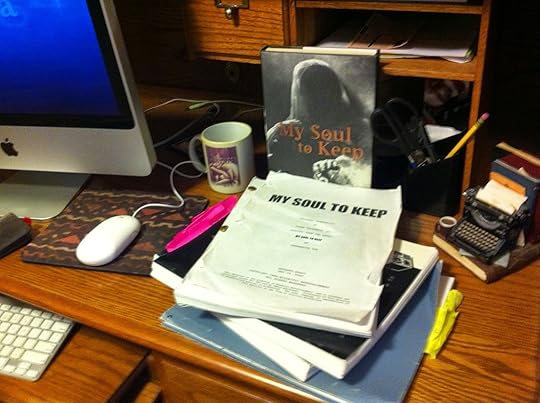
Are you working on a screenplay, or do you have a screenplay idea you’re not sure how to start?
Do you want input from industry professionals on your screenplay or idea?
Are you an author who would like to learn to adapt your own work to film?
Whether you’re a screenwriter, a prose writer or a producer, there has never been a more exciting time to try to get your foot in the door in television and film. But it all begins on the page – with a terrific screenplay or teleplay.
For the FIRST TIME, authors and screenwriters Steven Barnes and Tananarive Due (WGA) are offering a 30-day ONLINE screenwriting workshop Nov. 1-Dec. 1 to help you whip your project into shape. Because this is an inaugural course, we’re offering the workshop for the low introductory fee of $200 for early registration. (Late registration: $300.) Take this workshop from anywhere.
SPACE IS LIMITED. We may repeat this workshop in early 2015, but not at this price.
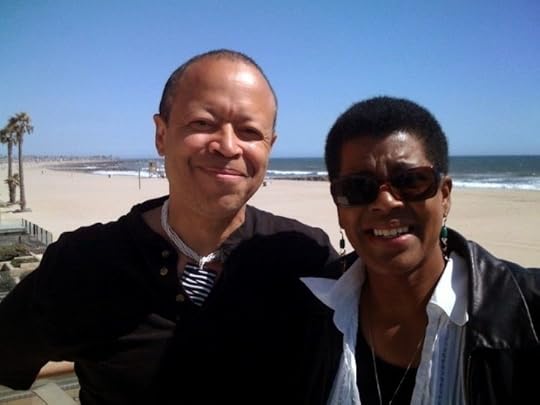
Here’s what you get:
· One 30-minute personal phone consultation with Steven Barnes or Tananarive Due · Notes on 10 pages of your screenplay and treatment/outline. (Choose whether to receive notes at the start of the workshop, during, or at the end of the workshop.) · Four weekly hour-long Google Hangout video sessions with instructors Steven Barnes and Tananarive Due · College-level syllabus with outside viewing and reading · A guest appearance by an industry professional to answer your questions · Peer review from other screenwriters in the workshop
Here’s what the workshop requires:
· Registration fee ($200 early-bird / $300 regular – SPACE IS LIMITED) · An existing screenplay or a screenplay idea you can outline · RECOMMENDED TEXTBOOK: Story by Robert McKee· Willingness to participate in peer review with other workshop members
· Internet access for one-hour weekly Google Hangout lectures / discussions
WANT TO ENROLL? Write to Tanacoach@gmail.com to reserve your space. You may also email us your questions.
Who are the instructors?
Steven Barnes
New York Times bestseller Steven Barnes has written more than twenty-five science fiction, fantasy, and horror novels. His “Stitch in Time” episode of “The Outer Limits” won an Emmy. The NAACP Image Award winner also has written for “The New Twilight Zone,” “StarGate,” Andromeda,” and “Ben 10.” He has been nominated for written for Hugo, Nebula and Cable Ace Awards. In 2013, he and his wife, Tananarive Due, co-wrote and co-produced the short film "Danger Word," based on their novel, Devil's Wake.
Tananarive Due
Tananarive Due, a member of the Writer's Guild of America (WGA), has been named to the Grio100 and Ebony Power 100. The Essence bestseller and NAACP Image Award winner has also won an American Book Award for The Living Blood. She recently received a Lifetime Achievement Award in the Fine Arts from the Congressional Black Caucus. She is the former Cosby Chair in the Humanities at Spelman College. In addition to co-producing and co-writing the short film "Danger Word" with Steven Barnes, she currently has several book projects under option.
WANT TO ENROLL? Write to Tanacoach@gmail.com to reserve your space. You may also email us your questions.
Published on October 08, 2014 13:42
May 1, 2014
"Danger Word" (2013) -- Horror short film adapted from Devil's Wake (starring Frankie Faison & Saoirse Scott)
I can't believe it: I actually made a zombie movie! This short film is my first foray into filmmaking--as a co-screenwriter and co-producer. My husband and collaborator, Steven Barnes, and I adapted our first published short story collaboration, a nasty little zombie story called "Danger Word," into a short film. It's a post-apocalyptic story about a grandfather trying to help his grandchild survive the zombie plague. We co-produced this short with the director, Luchina Fisher.
We crowdfunded, mostly on Facebook, and produced this film with the help of our amazing fan base.
We later expanded "Danger Word" into a YA-plus zombie novel, Devil's Wake (2012), which has been optioned on the basis of this film! Watch the film now. Option news below.
Here's my FB post on our option news:
FILM NEWS: We just signed the contract! Hubby Steven Barnes and I are optioning our YA+ zombie novel DEVIL'S WAKE to Tonya Lewis Lee, Spike Lee's wife and a producer at ToniK Productions. ToniK wants to produce a feature version of Devil's Wake! Lee first saw our short film adapated from the novel, Danger Word Film, after I met her at Atlanta's great Bronze Lens film festival last fall. She read both DEVIL'S WAKE and the sequel, DOMINO FALLS. Here's ToniK's mission statement: "ToniK focuses on diversity and women, developing original projects and adapting some of today’s top novels and biographies. At ToniK we believe in telling great stories that need to be told, with an eye towards authenticity. We are women. We are mothers. We are diverse." So excited!!! Check out the ToniK website here:http://tonikproductions.com/home/ Let's see what happens next! (And if you still haven't seen Danger Word, check out the ongoing Watch Party! Danger Word (online) Watch Party!!!! (The film link is www.dangerword.com)
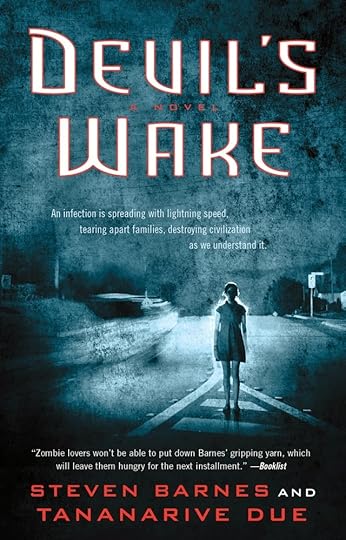
CLICK HERE TO ORDER DEVIL'S WAKE:
Here's the link to Shadow & Act's story: http://blogs.indiewire.com/shadowandact/tananarive-due-steven-barnes-zombie-novel-devils-wake-optioned-by-tonya-lewis-lee?utm_source=dlvr.it&utm_medium=twitter
Devil's Wake is the story of Kendra Brookings, an African-American teenager forced to fend for herself when she loses her family in the zombie plague. She meets a diverse band of teens, and they ride in a rickety schoolbus, fighting both "freaks" and "pirates" as they try to find the almost mythical island of Devil's Wake, rumored to be the safest place left in the world.
We crowdfunded, mostly on Facebook, and produced this film with the help of our amazing fan base.
We later expanded "Danger Word" into a YA-plus zombie novel, Devil's Wake (2012), which has been optioned on the basis of this film! Watch the film now. Option news below.
Here's my FB post on our option news:
FILM NEWS: We just signed the contract! Hubby Steven Barnes and I are optioning our YA+ zombie novel DEVIL'S WAKE to Tonya Lewis Lee, Spike Lee's wife and a producer at ToniK Productions. ToniK wants to produce a feature version of Devil's Wake! Lee first saw our short film adapated from the novel, Danger Word Film, after I met her at Atlanta's great Bronze Lens film festival last fall. She read both DEVIL'S WAKE and the sequel, DOMINO FALLS. Here's ToniK's mission statement: "ToniK focuses on diversity and women, developing original projects and adapting some of today’s top novels and biographies. At ToniK we believe in telling great stories that need to be told, with an eye towards authenticity. We are women. We are mothers. We are diverse." So excited!!! Check out the ToniK website here:http://tonikproductions.com/home/ Let's see what happens next! (And if you still haven't seen Danger Word, check out the ongoing Watch Party! Danger Word (online) Watch Party!!!! (The film link is www.dangerword.com)

CLICK HERE TO ORDER DEVIL'S WAKE:
Here's the link to Shadow & Act's story: http://blogs.indiewire.com/shadowandact/tananarive-due-steven-barnes-zombie-novel-devils-wake-optioned-by-tonya-lewis-lee?utm_source=dlvr.it&utm_medium=twitter
Devil's Wake is the story of Kendra Brookings, an African-American teenager forced to fend for herself when she loses her family in the zombie plague. She meets a diverse band of teens, and they ride in a rickety schoolbus, fighting both "freaks" and "pirates" as they try to find the almost mythical island of Devil's Wake, rumored to be the safest place left in the world.
Published on May 01, 2014 10:52
May 12, 2013
My first short film: Danger Word -- TWO DAYS of fundraising left before the shoot!
UPDATED 5/21: Big news! After years of circling and being circled by Hollywood, my husband, Steven Barnes, and I have written our first short film,
Danger Word
, based on our characters from our YA post-apocalyptic novel Devil's Wake. We're also co-producing it with director Luchina Fisher! The shoot is scheduled Memorial Day weekend in the woods of upstate New York, starring veteran actor Frankie Faison ("The Wire," "Banshee," Coming to America).
With two days to go, we have more than 100 donors who have helped us get so close to our preproduction goal of $15,000! Here's a video to tell you why we're making Danger Word independently, funded by fans, horror lovers and indie supporters.
The idea came up suddenly. I'm the Cosby Chair in the Humanities at Spelman College, and in March I hosted an Octavia E. Butler Celebration of the Fantastic Arts that included a black science fiction film festival. Seeing short pieces like Bree Newsome's Wake, Keith Josef Adkins' The Abandon and M. Asli Dukan's M.O.M.M. (based on Octavia E. Butler's Mind of My Mind) on the big screen reinforced the idea that I don't have to wait for money or a deal--I could make a short now.
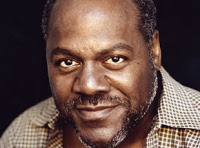 Frankie Faison stars
Frankie Faison stars
My infection with the independent spirit began sooner than that. Last fall, my first guest at Spelman was Sundance winner Ava DuVernay, who appeared with lead actress Emayatzy Corinealdi and showed us a clip from her groundbreaking feature Middle of Nowhere. During her talk, Ava reminded black writers and filmmakers to stop waiting for validation from Hollywood.
I'd had an example even closer to home. One of my oldest friends, journalist and filmmaker Luchina Fisher, wrote, directed and produced her first short film in 2012, Death in the Family . (The film chronicles the untimely death of Luchina's mother when she was a teenager, and how her father's coping mechanism turned out to be devastating to his daughters.)
I have been concentrating most of my screenwriting time on a feature version of My Soul to Keep, which has been in and out of film development for years--but I suddenly realized I wanted to make a short film first.
This great post in the cinema blog Shadow and Act has an interview with me and Steve about why we decided to start small.
We also understand that cultural barriers often stand in the way of getting films produced. And that stereotypes like the Magical Negro, the Sacrificial Negro and the Spiritual Guide are pervasive in science fiction and horror films. Steve and I discuss this frustrating phenomenon in our essay "Eulogy for the Sacrificial Negro."
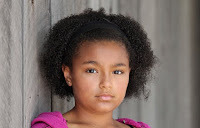 Saoirse Scott (Kendra)
Saoirse Scott (Kendra)
Bottom line: it was time to stop talking about making a movie and actually make a movie. Luchina funded her first film through Facebook alone, so we have a similar model with Phase I of our fundraising. The crowdfunding phenomenon--of community funding, as we call it--is giving us a new voice.
From the cast to the crew, we're all taking part in this project for the pure joy of telling this story our way.
This is the story of a 13-year-old girl, Kendra, who has survived the zombie plague in her Grandpa Joe's wooded cabin--and how her birthday goes badly awry. We're introducing a talented young actress, Saoirse Scott ("One Life to Live") as Kendra.
In this promo, watch Kendra's frantic Skype call to Grandpa Joe. (This is NOT footage from the film.)
Please help us bring our dream of adapting our work to film a reality! How can you help?
You can donate by clicking HERE--and learn about donor gifts, including DVDs and T-shirts.
Or, visit www.dangerwordfilm.com and learn more about this project.
Join the Danger Word Facebook page.
Follow Danger Word Film on Twitter: @ZombiesFreak.
Spread the word. Tell your friends. This is just the first step. We can do it together!
With two days to go, we have more than 100 donors who have helped us get so close to our preproduction goal of $15,000! Here's a video to tell you why we're making Danger Word independently, funded by fans, horror lovers and indie supporters.
The idea came up suddenly. I'm the Cosby Chair in the Humanities at Spelman College, and in March I hosted an Octavia E. Butler Celebration of the Fantastic Arts that included a black science fiction film festival. Seeing short pieces like Bree Newsome's Wake, Keith Josef Adkins' The Abandon and M. Asli Dukan's M.O.M.M. (based on Octavia E. Butler's Mind of My Mind) on the big screen reinforced the idea that I don't have to wait for money or a deal--I could make a short now.
 Frankie Faison stars
Frankie Faison stars My infection with the independent spirit began sooner than that. Last fall, my first guest at Spelman was Sundance winner Ava DuVernay, who appeared with lead actress Emayatzy Corinealdi and showed us a clip from her groundbreaking feature Middle of Nowhere. During her talk, Ava reminded black writers and filmmakers to stop waiting for validation from Hollywood.
I'd had an example even closer to home. One of my oldest friends, journalist and filmmaker Luchina Fisher, wrote, directed and produced her first short film in 2012, Death in the Family . (The film chronicles the untimely death of Luchina's mother when she was a teenager, and how her father's coping mechanism turned out to be devastating to his daughters.)
I have been concentrating most of my screenwriting time on a feature version of My Soul to Keep, which has been in and out of film development for years--but I suddenly realized I wanted to make a short film first.
This great post in the cinema blog Shadow and Act has an interview with me and Steve about why we decided to start small.
We also understand that cultural barriers often stand in the way of getting films produced. And that stereotypes like the Magical Negro, the Sacrificial Negro and the Spiritual Guide are pervasive in science fiction and horror films. Steve and I discuss this frustrating phenomenon in our essay "Eulogy for the Sacrificial Negro."
 Saoirse Scott (Kendra)
Saoirse Scott (Kendra)Bottom line: it was time to stop talking about making a movie and actually make a movie. Luchina funded her first film through Facebook alone, so we have a similar model with Phase I of our fundraising. The crowdfunding phenomenon--of community funding, as we call it--is giving us a new voice.
From the cast to the crew, we're all taking part in this project for the pure joy of telling this story our way.
This is the story of a 13-year-old girl, Kendra, who has survived the zombie plague in her Grandpa Joe's wooded cabin--and how her birthday goes badly awry. We're introducing a talented young actress, Saoirse Scott ("One Life to Live") as Kendra.
In this promo, watch Kendra's frantic Skype call to Grandpa Joe. (This is NOT footage from the film.)
Please help us bring our dream of adapting our work to film a reality! How can you help?
You can donate by clicking HERE--and learn about donor gifts, including DVDs and T-shirts.
Or, visit www.dangerwordfilm.com and learn more about this project.
Join the Danger Word Facebook page.
Follow Danger Word Film on Twitter: @ZombiesFreak.
Spread the word. Tell your friends. This is just the first step. We can do it together!
Published on May 12, 2013 06:22
My first short film: Danger Word -- two weeks of fundraising left before the shoot!
Big news! After years of circling and being circled by Hollywood, my husband, Steven Barnes, and I have written our first short film,
Danger Word
, based on our characters from our YA post-apocalyptic novel Devil's Wake. We're also co-producing it with director Luchina Fisher! The shoot is scheduled Memorial Day weekend in the woods of upstate New York, starring veteran actor Frankie Faison ("The Wire," "Banshee," Coming to America).
With two weeks to go, we're more than halfway past our preproduction goal of $15,000! Here's a video to tell you why we're making Danger Word independently, funded by fans, horror lovers and indie supporters.
The idea came up suddenly. I'm the Cosby Chair in the Humanities at Spelman College, and in March I hosted an Octavia E. Butler Celebration of the Fantastic Arts that included a black science fiction film festival. Seeing short pieces like Bree Newsome's Wake, Keith Josef Adkins' The Abandon and M. Asli Dukan's M.O.M.M. (based on Octavia E. Butler's Mind of My Mind) on the big screen reinforced the idea that I don't have to wait for money or a deal--I could make a short now.
 Frankie Faison stars
Frankie Faison stars
My infection with the independent spirit began sooner than that. Last fall, my first guest at Spelman was Sundance winner Ava DuVernay, who appeared with lead actress Emayatzy Corinealdi and showed us a clip from her groundbreaking feature Middle of Nowhere. During her talk, Ava reminded black writers and filmmakers to stop waiting for validation from Hollywood.
I'd had an example even closer to home. One of my oldest friends, journalist and filmmaker Luchina Fisher, wrote, directed and produced her first short film in 2012, Death in the Family . (The film chronicles the untimely death of Luchina's mother when she was a teenager, and how her father's coping mechanism turned out to be devastating to his daughters.)
I have been concentrating most of my screenwriting time on a feature version of My Soul to Keep, which has been in and out of film development for years--but I suddenly realized I wanted to make a short film first.
This great post in the cinema blog Shadow and Act has an interview with me and Steve about why we decided to start small.
We also understand that cultural barriers often stand in the way of getting films produced. And that stereotypes like the Magical Negro, the Sacrificial Negro and the Spiritual Guide are pervasive in science fiction and horror films. Steve and I discuss this frustrating phenomenon in our essay "Eulogy for the Sacrificial Negro."
 Saoirse Scott (Kendra)
Saoirse Scott (Kendra)
Bottom line: it was time to stop talking about making a movie and actually make a movie. Luchina funded her first film through Facebook alone, so we have a similar model with Phase I of our fundraising. The crowdfunding phenomenon--of community funding, as we call it--is giving us a new voice.
From the cast to the crew, we're all taking part in this project for the pure joy of telling this story our way.
This is the story of a 13-year-old girl, Kendra, who has survived the zombie plague in her Grandpa Joe's wooded cabin--and how her birthday goes badly awry. We're introducing a talented young actress, Saoirse Scott ("One Life to Live") as Kendra.
In this promo, watch Kendra's frantic Skype call to Grandpa Joe. (This is NOT footage from the film.)
Please help us bring our dream of adapting our work to film a reality! How can you help?
You can donate by clicking HERE--and learn about donor gifts, including DVDs and T-shirts.
Or, visit www.dangerwordfilm.com and learn more about this project.
Join the Danger Word Facebook page.
Follow Danger Word Film on Twitter: @ZombiesFreak.
Spread the word. Tell your friends. This is just the first step. We can do it together!
With two weeks to go, we're more than halfway past our preproduction goal of $15,000! Here's a video to tell you why we're making Danger Word independently, funded by fans, horror lovers and indie supporters.
The idea came up suddenly. I'm the Cosby Chair in the Humanities at Spelman College, and in March I hosted an Octavia E. Butler Celebration of the Fantastic Arts that included a black science fiction film festival. Seeing short pieces like Bree Newsome's Wake, Keith Josef Adkins' The Abandon and M. Asli Dukan's M.O.M.M. (based on Octavia E. Butler's Mind of My Mind) on the big screen reinforced the idea that I don't have to wait for money or a deal--I could make a short now.
 Frankie Faison stars
Frankie Faison stars My infection with the independent spirit began sooner than that. Last fall, my first guest at Spelman was Sundance winner Ava DuVernay, who appeared with lead actress Emayatzy Corinealdi and showed us a clip from her groundbreaking feature Middle of Nowhere. During her talk, Ava reminded black writers and filmmakers to stop waiting for validation from Hollywood.
I'd had an example even closer to home. One of my oldest friends, journalist and filmmaker Luchina Fisher, wrote, directed and produced her first short film in 2012, Death in the Family . (The film chronicles the untimely death of Luchina's mother when she was a teenager, and how her father's coping mechanism turned out to be devastating to his daughters.)
I have been concentrating most of my screenwriting time on a feature version of My Soul to Keep, which has been in and out of film development for years--but I suddenly realized I wanted to make a short film first.
This great post in the cinema blog Shadow and Act has an interview with me and Steve about why we decided to start small.
We also understand that cultural barriers often stand in the way of getting films produced. And that stereotypes like the Magical Negro, the Sacrificial Negro and the Spiritual Guide are pervasive in science fiction and horror films. Steve and I discuss this frustrating phenomenon in our essay "Eulogy for the Sacrificial Negro."
 Saoirse Scott (Kendra)
Saoirse Scott (Kendra)Bottom line: it was time to stop talking about making a movie and actually make a movie. Luchina funded her first film through Facebook alone, so we have a similar model with Phase I of our fundraising. The crowdfunding phenomenon--of community funding, as we call it--is giving us a new voice.
From the cast to the crew, we're all taking part in this project for the pure joy of telling this story our way.
This is the story of a 13-year-old girl, Kendra, who has survived the zombie plague in her Grandpa Joe's wooded cabin--and how her birthday goes badly awry. We're introducing a talented young actress, Saoirse Scott ("One Life to Live") as Kendra.
In this promo, watch Kendra's frantic Skype call to Grandpa Joe. (This is NOT footage from the film.)
Please help us bring our dream of adapting our work to film a reality! How can you help?
You can donate by clicking HERE--and learn about donor gifts, including DVDs and T-shirts.
Or, visit www.dangerwordfilm.com and learn more about this project.
Join the Danger Word Facebook page.
Follow Danger Word Film on Twitter: @ZombiesFreak.
Spread the word. Tell your friends. This is just the first step. We can do it together!
Published on May 12, 2013 06:22
January 23, 2013
Book excerpt: DOMINO FALLS (2/19) (sequel to DEVIL'S WAKE)
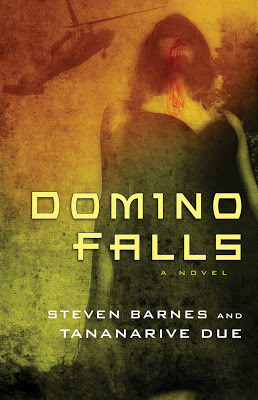
Our young protagonists, including Kendra and Terry, are on a dangerous road trip in a school bus after Freak Day, when an infection causing rabies-like symptoms in humans swept the nation...and perhaps the world. They are on their way to a settlement called Domino Falls, where they hope to find safety and shelter. On the way, a man wearing a birthday hat has waved them down on the road. Kendra waits in the bus while her friends investigate his home. Since Freak Day, nothing is as it seems.
CLICK TO BUY NOW ***** The wait outside seemed interminable. The Christmas music changed to the Chipmunks singing about hula hoops, one of Kendra's favorites when she was young. The high-pitched revelry made her eyes sting with tears. She and her mother and father had sucked helium from balloons and sung along to that song every year. The sudden memory was so vivid that her knees went weak and the sky seemed to dim. After what seemed like forever, Ursulina and Dean came back out, trailed by the portly stranger. Only the stranger was smiling. He proudly held out a cake cutter he might have retrieved from the kitchen. "Clear," Ursulina said. "No one in the house. Looks like the family's out back. We saw them through the window." "Kids?" Sonia said, anxious. Ursulina nodded. "Just like I told you," the stranger said, and waved them all along the side of the house. "Come on around. They're waiting." The little man bounced ahead of them to a back yard gate that lay open, waiting, walking light on the balls of his feet. Happy happy, joy joy. Could it be contagious? They followed him around to the back. First they passed play set that looked almost new: swings and a small slide. Next to that, a tree house with both wood-slat ladders nailed into a bare-limbed apricot tree, and a knotted rope that looked an inch and a half thick, now swaying in the breeze. All of it looked like it might have been constructed since Freak Day. Past the tree, Kendra finally saw the stranger's family. Three of them sat at a large red cedar picnic table had been draped with a gaily-colored table cloth; two small girls and a woman with frizzy yellow hair. "One...two...three..." the girls were saying in piping unison, and dissolving into giggles. "One...two...three..." The others didn't see their approach because their backs were to them, all of them wearing identical birthday hats, oblivious to the world around them. A small evergreen beside the table was strung with tinsel and candy canes, and topped with a silver star. The table was piled with gaudily wrapped boxes and what looked like mailing tubes.How had this family created an oasis when everything else was gone? The girls were laughing and eating cake with their fingers, not waiting for their father to cut it. Kendra was close enough to Terry to hear him draw a startled breath. "I don't know if I want to laugh or cry," he whispered to her. Kendra wanted to do both. Her hand sought his, their fingers twining together. Everything seemed...so normal. As if the devastation that had touched the rest of the world hadn't quite penetrated here. But not quite. What was it? Suddenly, Kendra knew, and felt a chill: Why were they celebrating outside the house? The December air was cold, and only the father was wearing a jacket. The others were barely dressed, practically in rags. What the--The sudden sound of Hipshot's urgent barking made Kendra jump, startled. The dog had followed them after all, standing between them and the picnic table. "I knew it..." Ursulina said, taking a step back. If not for the tremor in her voice, she'd have sounded triumphant. Now that she was only twenty feet from the table, Kendra was close enough to see the cords wound around the family's feet. Dean swung his rifle up. "What the hell is going on?" "Just a party," the little man said, and when he turned, he seemed too bright, too happy. Why hadn't they seen it? "Every day, we have a party. Can't wait for Christmas."Their kids and the mother turned toward them, their private party disturbed. Their eyes were reddish, their faces threaded with tiny vines, like rogue veins, growing where no veins should grow. All three tried to lunge to their feet, but they were held in place by cables fastened to their waists. They hissed and thrashed, but the girls made laughing sounds. "One...two...three..." they said in unison, twins even now. The girls might have been pretty once, but no more. Their round cheeks and matted blonde hair were ghoulish. Kendra stood behind Terry, who had pulled out his Browning 9mm. Sometimes, freaks could talk! After the way she'd lost Grandpa Joe, Kendra didn't think she could ever forget it, but those girls had fooled her. What if one of them had been too close? Everyone who'd brought a gun had it trained on someone. Terry's was on the stranger. "What do you want from us?" Terry said, raising his voice to be heard over Hipshot's ferocious growling and barking. "Why'd you bring us back here?" "The girls were born on Christmas Day," he said. Now Kendra could hear his pain, grief, shock. "We've always celebrated all month, so they wouldn't feel cheated. Can you help me give them their present? I know it's what they want." Terry backed up a step, and Kendra gladly backed up with him. Piranha cursed, and they formed an instinctive half-circle to protect themselves, ready to fire and flee. His family was straining at the end of their ropes now, mouths stretched wide, yearning, fingers questing."What present?" Terry said, his voice unsteady. "Man, you're crazy. You can't help them. Let us make sure you're not bit, and you can come with us. Leave them here." The man shook his head, insistent. "I need you to help me give them their present," he said, and his voice broke. "I can't do it. Can't you see? Look at them! Listen to my girls laughing! They sound exactly the same. I want to, but...I can't."Those might have been his sanest words yet, Kendra realized. Her throat swelled with grief for a family she'd never known. "Let's get the hell out of here," Sonia said, tugging on Piranha. But Piranha didn't move. He was staring at Terry. And Ursulina. For the first time Kendra could remember, they didn't have a plan. They didn't know what to do. "She's right," Kendra said. "Let's go. We shouldn't have stopped." Terry shook his head, taking another step back. "I'm sorry," he told the pleading man. "We can't help you." But Kendra's eyes were drawn to Ursulina, who was gazing at the kids with curled lips and dead eyes. Then Ursulina looked toward Dean, and their eyes locked with a spark of communication. A pair of barely perceptible nods between them in an unspoken tongue that only they seemed to know. Ursulina, after all, had fought in a war when the barracks where they'd found her fell to an army of freaks. And Dean's war had followed him to his dreams; the war he'd fought at home. "I can do it," Dean said. Ursalina nodded. "Yeah. We can do this." Dean looked at Darius, who shook his head. All jokes were far from Darius's face. "Not me, bro," Darius said. "I'm going back to my bike." "Go on," Dean said, nodding. "You and the others wait for us." "Sir?" Terry gently to the man. "Step around front with us, please. You don't want to be here right now." Kendra dared to hope that if she made it back to the bus fast enough and covered her ears, she could pretend she'd never seen the bizarre Christmas scene in the back yard. But she never had the chance. The stranger didn't come toward Terry. Instead, he rushed to the picnic table, toward his wife and children, his arms wide to embrace them. All Kendra saw was the ecstatic grin on his face. "I'm sorry, Melissa," he said. "I'm sorry, Caitlin and Cathy. Merry Christmas, angels. Happy birthday!" For an instant, Kendra thought they were only trying to hug him too; they were all wrapped in an iron embrace, a tangle of frantic limbs. But Kendra closed her eyes when she saw their teeth. By the time the gunshots finally came from Ursulina and Dean, she had been praying for the sound of death.
© Copyright 2013 by Steven Barnes and Tananarive Due
DOMINO FALLS (Atria) is the sequel to DEVIL'S WAKE (2012). This zombie series is appropriate for adults and YA readers age 14 and older. For a daily newsletter from the zombiesphere, "The Devil's Wake Survivors' Daily," follow @ZombiesFreak on Twitter. You can also join the Devil's Wake Series page on Facebook.
CLICK HERE TO BUY NOW
Published on January 23, 2013 06:00



